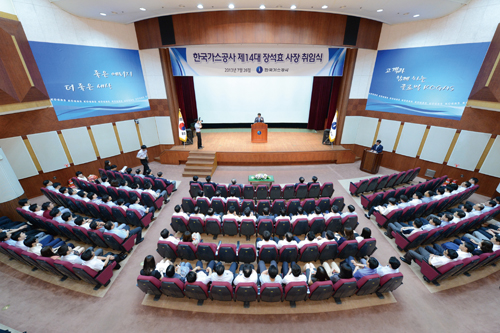Vice President Chang Seok-hyo has been promoted to the 14th president and CEO of Korea Gas Corp. (Kogas) at a shareholders’ meeting held on July 23 at the Kogas head office in Bundang, Gyeonggi Province, succeeding President Choo Kang-soo who resigned on July 5, the company said recently.
President Chang became the first career Kogas officer to make it to the top in the company’s 30-year history.
The new CEO, in a telephone conversation with a reporter, said he feels a heavy responsibility by being the first one to get promoted to the top position from within the company in its history. He added that it’s a great honor for him and his family and he will push himself to work hard since there are many projects that need consultation with the government and the parliament.
Chang said he thought the whittling down of the company’s high debt ratio is the foremost task he is faced with by tightly managing debt through successful gas exploration operations overseas. The company’s debt ratio stands at 390 percent, which is so high that the company has little room to borrow for more natural gas exploration operations. He said Kogas should analyze seriously the profitability of a gas well before launching exploration, which will slow the number of exploration projects by the company to far fewer than were undertaken during the Lee Myung-bak government.
Chang, however, said he is not negative about all of the gas exploration projects at work now, but wants to eliminate those that have low prospects for finding gas.
He said he is for continuing to participate in the Mozambique gas field in which Kogas holds a 10 percent stake of the consortium led by ENI of Italy. The consortium is also building a 59 km gas pipeline to supply LNG to Maputo, the capital of Mozambique. Chang said the company can’t afford to give up this project because it is too lucrative.
But the new president appeared to favor joint exploration projects with private investors, sharing the risks and concentrating in regions with a greater chance for finding gas deposits. He will try to find private investors or firms to join Kogas in its big overseas projects.

Chang also unveiled his opinions on the expanded import of LNG by Kogas alone, which has become a ‘hot potato’ in the energy industry with the parliament and the industry debating Kogas’ exclusive rights to import LNG.
He said the advantages of both Kogas and private firms importing LNG should be harmonized. Kogas should not appear to be egotistical to the public in exercising its exclusive rights to import LNG, Chang said, appearing to accept arguments that Kogas should share the rights with private energy importers. He, at the same time, said Kogas was launched to secure a stable supply of LNG from overseas and the company has been doing just that without a hitch, adding that the public entity is needed to balance the LNG market, calling for the need for solutions that would not go against the government and the public entity.
The government instructed the government-owned companies to be judicious about selecting its top officers, even including background checks of the candidates. Chang is the first one to be named CEO following the tough selection process put into force.
A total of eight candidates applied for the presidency of Kogas and two were chosen by the Public Entity Management Committee of the Ministry of Strategy and Finance — Chang and Kim Jeong-kwan, former second vice minister of the Ministry of Trade, Industry and Resources. Chang was named the new president on July 25 at a shareholder’s meeting, which included representatives for the government’s 26.86 percent of stake, the largest among shareholders, the Korea Electric Power Corp. with 24.46 percent, the second largest, Seoul City with 3.99 percent, and local autonomous organizations sharing 9.5 percent among them.
